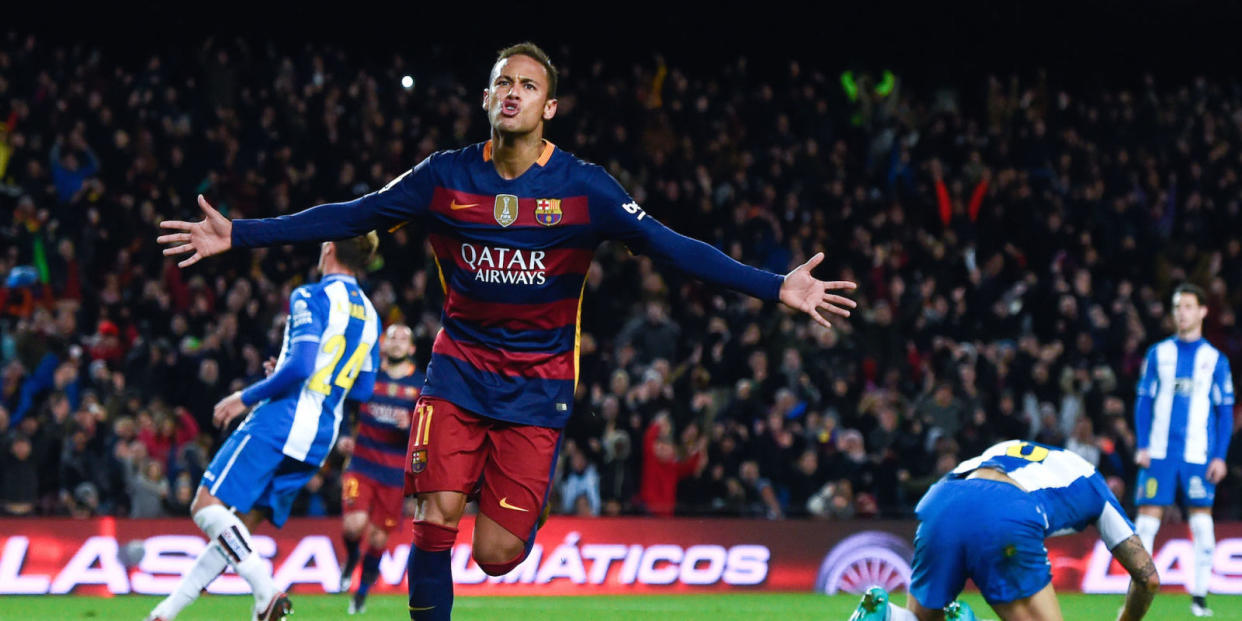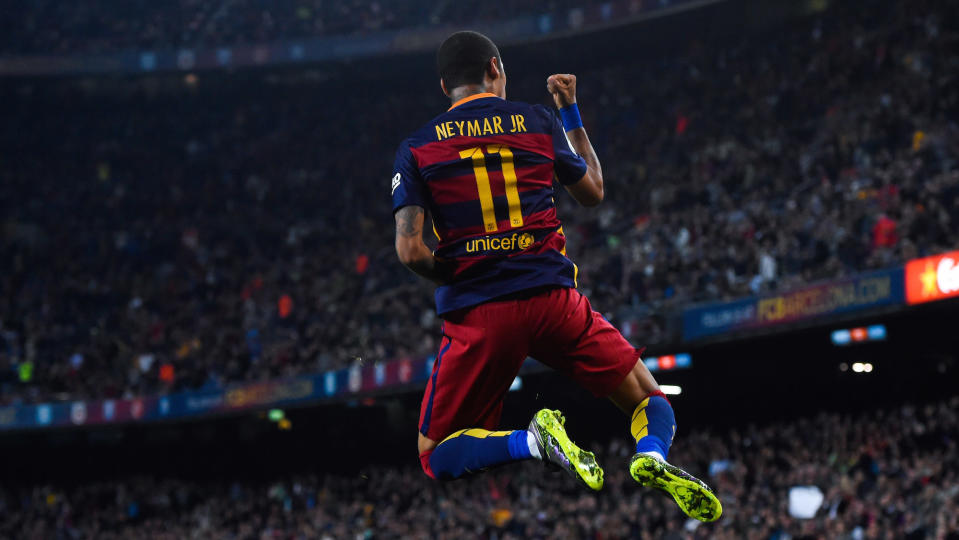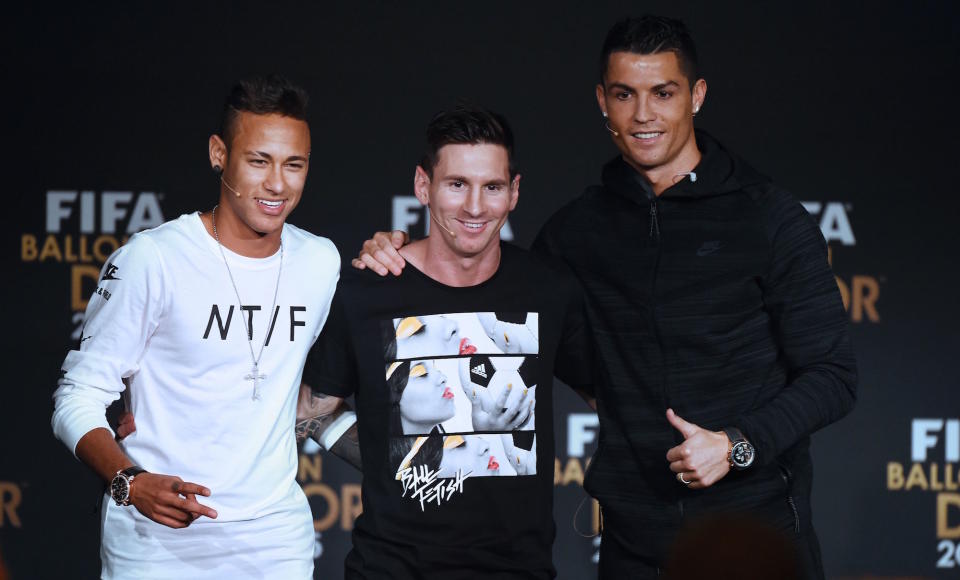How Can You Rationalize Spending $500 Million on a Soccer Player?

Executives at a French company confirmed Thursday night that they will pay well over $500 million to get a 25-year-old Brazilian man to come work for them. The company is a soccer club called Paris Saint-Germain, an outfit that has only recently risen to prominence despite its swanky location, and the prospective employee is a fleet-footed, free-scoring forward from FC Barcelona named Neymar. PSG has agreed to pay around $263 million to Barcelona to pry him away from the Spanish club-the full release clause in his contract, a requirement by Spanish law, which the Catalonian outfit set at a level no one would ever pay. But PSG will, and they've also settled on a separate five-year contract with the player himself, one that will see the samba magician take home around $35.4 million a year after tax. They will even pay Neymar's father, who doubles as his agent, a fee that could rise to $47.5 million.
It's a gobsmacking amount of money, one that shatters the previous record of $116 million that Manchester United paid for Paul Pogba just last summer. But the Parisian club's oil-rich Qatari owners can afford it. They can do it. But should they?
European soccer has exploded as a product over the last decade. The continent has long been home to strong leagues in a number of countries-England, Spain, Italy, Germany, France-and a super-competition called the Champions League where the world's game is played at the highest level. (Higher, yes, than what we see every four years at the World Cup.) But with the rapid expansion of both the game and technology to access it in the developing world, combined with rising interest in the United States and Asia, the European game's potential as an intercontinental export has reached new heights.
That culminated with the newest TV contract for England's Barclays Premier League, which will see the league's 20 clubs rake in $13.75 billion over just three years. That's some serious quid, and the result is that even the league's bottom-tier clubs are spending some big-time money. A.F.C. Bournemouth, for example, a tiny club on England's south coast, spent $26 million on a defender named Nathan Aké last month-plus whatever they pay him in salary.
This whole state of affairs has also received a monetary injection from a growing cast of billionaire owners, who have started buying up teams all over the continent. There's Roman Abramovich, the Russian oligarch and close Putin ally at London's Chelsea FC. There's the sheiks from the United Arab Emirates who bought Manchester City and combined it with clubs in Melbourne and New York to create a worldwide sporting apparatus. And there's PSG's owners, the Qataris who inaugurated a new era at the club in 2011 and then started buying up everyone, up to and including Neymar.
The samba magician will be paid around $35.4 million a year after tax.
So far, according to The Guardian, teams in those top five leagues have spent around $3.7 billion on players during this summer transfer window, which only began in late May. That's just in transfer fees between teams-it doesn't include wages for the players-and it's roughly equal to Germany's 2016 gross domestic product. All that money is flowing because, contrary to traditional conceptions of the transatlantic contrast between European and American attitudes, European soccer is almost completely deregulated. There are no salary caps, and revenue sharing between teams is less generous or non-existent.
Until recently in Spain, for example, Real Madrid and Barcelona-two of the world's biggest, most prestigious, clubs-negotiated their TV contracts separately from the rest of the league. This had the effect of widening the divide between them and the rest of the league year after year, making their dominance a self-fulfilling prophecy. Clubs that qualify for the Champions League benefit from $52 million or more in annual revenue, which has long had a similar effect and made social mobility from the upper middle class to the true nobility significantly harder-unless, like PSG, you find yourself a billionaire backer.

This kind of thing isn't tolerated in American sports, where the quest for relative parity-even among smaller-market outfits-has created what actually serves to be a semi-socialist (or, at least, fiercely regulated capitalist) system. It's enough to make American heads explode, but it's European sports that operate on the true free market. (Major League Baseball is the most free-market of the American leagues, with no salary cap and a few teams-chief among them the New York Yankees-who have lured more than a few players off other teams at their peak using sheer financial clout that others can't match.)
Think of it as reverse-healthcare. The big fish in Europe are true giants, eating up all the smaller fry by buying up their best players and then earning more revenue with their more competitive squads. The anarcho-capitalism of European super-clubs is laid all the more bare by the fact that soccer teams do not conduct trades. Players are bought and sold as individual assets, and it's exceedingly rare for a transaction to include more than one player. That's why the Neymar deal sticks out like a nine-figure neon sign: It's not concealed by any make-weights of other assets moving the other way. It's just straight cash.
That's why the Neymar deal PSG has reached with Barcelona sticks out like a nine-figure neon sign.
With all that cash comes questions. The first is whether this is really defensible as a practical matter. The hard truth is that Neymar is not even the best player on his current team. Granted, he happens to line up alongside the greatest player who ever lived, Lionel Messi. That's actually, by some reports, one of the reasons Neymar is interested in moving on. (Another: PSG has offered to pay him a king's ransom.) He's interested in being The Main Man at a major club, and in competing for the Ballon d'Or-for the world's greatest player-which he's essentially shut out of as long as he's next to (and, like everyone else, stuck in the shadow) of soccer's Great One.
But Neymar is also six years younger than Messi. He will spend his athletic prime in Paris and help PSG compete to win the Champions League, which has eluded them repeatedly since the Qataris knighted the capital club six years ago. He will also enter his commercial prime. Neymar is already a formidable marketing product-and product is at least one dimension of the superstar athlete-but if he can compete for or win the Ballon d'Or while ascending to become the brightest light in the city of them, it presents a huge opportunity for the various corporate entities that lurk around the game, looking to syphon off dollars. Perhaps PSG would garner sufficient return on this massive investment.
There's also the question of whether this is a one-off or the start of a new era. The previous transfer record was set last summer at $116 million. If Bournemoth are dishing out $26 million, and fees of $80 million or more are increasingly routine, how long until upwards of $250 million for the best young player of his generation seems like a good deal? Whether it all exists within a bubble or not, that could constitute the new reality not long from now. That goes especially when he represents a step up in class for the relative upstarts. PSG's owners know that they can't buy the prestigious history of Real or Barcelona or Bayern Munich or Manchester United, but their general manager, Jean-Claude Blanc, told the Financial Times (via The New York Times) that the hope is to be "the first great club of the digital era." Neymar presents them with that opportunity.

The other question, of course, is whether all this is defensible from an ethical standpoint. The moral implications of these monsoons of cash in the soccer world have been debated for some time. Every transfer window, like clockwork, Britain's punditocracy will deposit think-pieces about football finance in the age of global super-inequality on the Internet's doorstep. Then the show will go on. But the shocking sums in the Neymar deal have summoned a new discussion altogether. The story emerged Thursday of how a high-level sports lawyer working the deal was rejected at the offices of the Spanish league on the basis that the deal violated Financial Fair Play, FIFA's (obviously inept) attempt to moderate obscene spending by its largest member clubs. The thought of a besuited barrister standing on a sidewalk holding a check for 222 million euros that he can't get someone to cash is a wickedly beautiful microcosm of our times.
Teams in those top five leagues have spent around $3.7 billion on players during this summer transfer window
After all, the average salary in Paris is, by some estimates, a little less than $3,000 a month. France is struggling with sluggish growth and high unemployment. Outside the developed world, circumstances are far graver. In Qatar, the tiny Gulf nation supplying these bottomless buckets of oil-soaked cash, income inequality is severe, with the richest taking home 13 times more than the poorest. More than that, rampant labor and human rights abuses-including of workers constructing the facilities for the 2022 World Cup, which Qatar secured from FIFA under heavily scrutinized circumstances-make life outside the royal family and ruling classes there more than unpleasant.
The question ultimately comes down to how much we can justify paying to entertain ourselves when so many struggle just to get by. A Basquiat painting sold for more than $110 million in May, and it can't even dribble. More than that, it may now only be for its owner to enjoy. A fantastic athlete, on the other hand, is for all of us. Neymar is a deadly goalscorer, a genius playmaker, and perhaps the best dribbler in the game. For what it's worth, a comfortable majority of PSG's fans would almost certainly back their team's outlay on this one. Yes, it's an obscene sum, but it's not their money. And in the late capitalist economy, the joy of watching a winning team each Saturday is one of the only reprieves available for the growing cadre of workers stuck with longer hours and stagnant wages. There's a twisted irony there, but it's true.
With ticket prices these days, it isn't just PSG who will have to choose how much that quality entertainment is worth. We're all forced to decide what it's worth to us, and whether we can support a system that, for all the quintessentially American rhetoric about free market meritocracy, are not really defensible by any traditional measure. It's the macroeconomic version of the CTE conundrum facing NFL fans. Personally, I'd be lying if I said I won't be watching what Neymar gets up to in Paris. It is something of a tragedy that one of the great forward lines of all time-Neymar, Messi, and the troubled-but-brilliant Luis Suarez-has been broken up in Barcelona. But there's no doubt that Brazil's captain is more than good enough to be the face of what is essentially an international sporting corporation. I mean, this kid can play.
You Might Also Like

